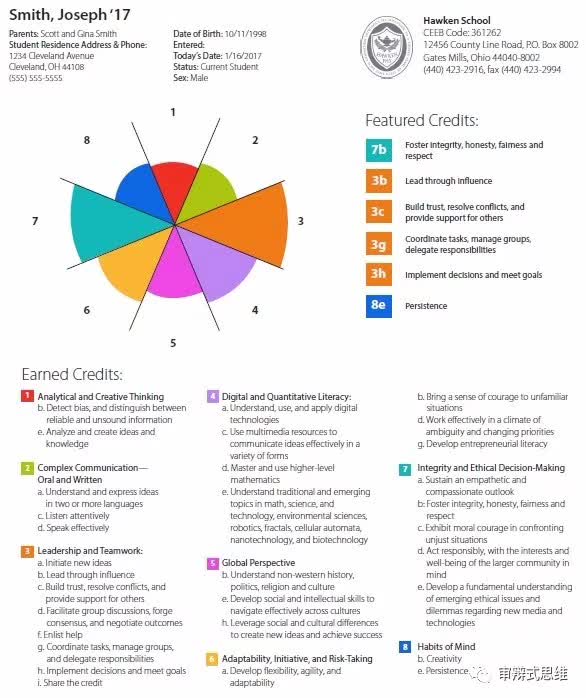2017年5月10日,由逾百所美国顶尖私立高中组成的MT联盟(Mastery Tran Consortium,简称MTC)正式推出了一种新的学生评价体系“新模式(A New Model)”。“新模式”目前已获帮助申请者择校的美国大学择校性价评估系统(Coalition for Access, Affordability and Success,简称CAAS)的支持。CAAS 的用户包括哈佛大学、耶鲁大学、普林斯顿大学等80余所美国著名高校。
“新模式”的发起人为全美排名前25的俄亥俄州霍肯(Hawken)高中的校长Scott Looney,他同时也是MTC联盟发起人。他2016年3月在美国私立学校协会年度会议上首次提出自己的构想,很快吸引到不少顶级私立高中的响应。
“新模式”包含两个突出特点:
1、没有分数,没有级别,只是持续追踪、记录、评估学生的8种核心能力的特点(包括沟通能力、口头及书面表达、分析和创新思维、数量素养、思维习惯等),报告学生在8种核心能力上的“掌握学分(Mastery Credits)”,用描述性的评价取代分数评价,并配以直观的放射图说明。
2、成绩报告与课程脱钩,在关于学生的成绩报告中没有课程、科目的名称,仅仅包含学生的“掌握学分”和相关描述。
这是一份根据“新模式”做出的一份学生的评估报告:

其中包含对该学生的8种能力的评估。在8种能力的评估中,包含61项具体的指标。这8中能力和61项指标如下:
A NewModel by Mastery Transcript Consortium
综合素质评价体系新模型(8项能力和61项指标)
AvailableCredits:
可得学分
1.Analytical and Creative Thinking
分析思维和创新思维
a. Identify, manage andaddress complex problems
识别、处理和设法解决复杂问题
b. Detect bias, anddistinguish between reliable and unsound information
发现偏见,区分可靠信息和不可靠信息
c. Control informationoverload
控制信息过量
d. Formulate meaningfulquestions
形成有意义的提问
e. Analyze and createideas and knowledge
分析和创造观点与知识
f. Use trial and error;devise and test solutions to problems
使用试错法,提出并且检验问题的解决方案
g. Imagine alternatives
构想替代方案
h. Developcross-disciplinary knowledge and perspectives
增强跨学科的知识和视野
i. Engage in sustainedreasoning
进行持续推理
j. Synthesize and adapt
具备综合能力与适应能力
k. Solve new problemsthat don’t have rule-based solutions
解决没有规则可循的新问题
l. Use knowledge andcreativity to solve complex “real-world” problems
运用已有知识和创新意识解决复杂的实际问题
2.Complex Communication—Oral and Written
复杂交流(口头沟通和书面表达)
a. Understand andexpress ideas in two or more languages
用不少于两种语言理解和表达想法
b. Communicate clearlyto diverse audiences
与不同背景的受众清楚明白地交流
c. Listen attentively
倾听
d. Speak effectively
有效陈述
e. Write clearly andconcisely—for a variety of audiences
针对各类受众清楚准确地书写
f. Explain informationand compellingly persuade others of its implications
解释信息并能说服他人相信其意义
3.Leadership and Teamwork:
领导力和团队精神
a. Initiate new ideas
提出新想法
b. Lead throughinfluence
通过影响力来领导
c. Build trust, resolveconflicts, and provide support for others
建立信任,解决争端,提供支持
d. Facilitate groupdiscussions, forge consensus, and negotiate outcomes
促进小组讨论,达成一致意见,磋商可能结果
e. Teach, coach andcounsel others
指导、训练和劝告他人
f. Enlist help
寻求帮助
g. Collaborate tasks,manage groups, and delegate responsibilities
协调任务,管理团队,划分责任
h. Implement decisionsand meet goals
执行决策并达到目标
i. Share the credit
分享荣誉
4.Digital and Quantitative Literacy:
数字素养和定量素养
a. Understand, use, andapply digital technologies
理解和运用数字技术
b. Create digitalknowledge and media
创造数字知识和数字媒体
c. Use multimediaresources to communicate ideas effectively in a variety of forms
以不同形式使用多媒体资源进行有效的思想交流
d. Master and usehigher-level mathematics
掌握并使用更高层次的数学
e. Understandtraditional and emerging topics in math, science, and technology, environmentalsciences, robotics, fractals, cellular automata, nanotechnology, andbiotechnology
理解以下学科中传统课题和新兴课题:数学、科学和技术,环境科学,机器人学,分形学,细胞自动机,纳米技术,生物技术
5.Global Perspective
全球视野
a. Developopen-mindedness, particularly regarding the values, traditions of others
具有开放心态,尤其要尊重他人的价值观和习俗
b. Understandnon-western history, politics, religion and culture
理解非西方历史、政治、宗教和文化
c. Develop facilitywith one or more international languages
用不少于一种国际语言增强才能
d. Use technology toconnect with people and events globally
使用技术将全球人物和事件联系起来
e. Develop social andintellectual skills to navigate effectively across cultures
发展社会技能和智力技能, 找到正确方法有效解决跨文化问题
f. Use 21st centuryskills to understand and address global issues
使用二十一世纪技能理解和解决全球性问题
g. Learn from, and workcollaboratively with, individuals from diverse cultures, religions, and lifestylesin a spirit of mutual respect and open dialogue
向具有不同文化、宗教和生活方式的人员学习,与他们协作开展工作,相互尊重,坦诚对话
h. Leverage social andcultural differences to create new ideas and achieve success
利用社会和文化差异建立新观念并获得成功
6.Adaptability, Initiative, and Risk-Taking
适应性、独创性和冒险精神
a. Develop flexibility,agility, and adaptability
培养灵活性、敏锐性和适应性
b. Bring a sense ofcourage to unfamiliar situations
有勇气面对不熟悉环境
c. Explore andexperiment
探索和尝试
d. Work effectively ina climate of ambiguity and changing priorities
在不明确并且变化的形势下有效开展工作
e. View failure as anopportunity to learn, and acknowledge that innovation involves small successesand frequent mistakes
视失败为学习机会,并且承认创新既会有小成功也经常会出错
f. Cultivate anindependence of spirit to explore new roles, ideas, and strategies
培养独立精神探索新角色新理念新策略
g. Developentrepreneurial literacy
增强创业素养
7.Integrity and Ethical Decision-Making
诚实正直和伦理道德决策
a. Sustain anempathetic and compassionate outlook
具有同情怜悯心
b. Foster integrity,honesty, fairness and respect
培养正直、诚实、公平和尊重他人等品行
c. Exhibit moralcourage in confronting unjust situations
面对不公平情形敢于伸张正义
d. Act responsibly,with the interests and well-being of the larger community in mind
为行动负责,将大多数人的利益和幸福牢记于心
e. Develop afundamental understanding of emerging ethical issues and dilemmas regarding newmedia and technologies
不断理解新媒体和新技术引起的新伦理问题和新困境
f. Make reasoned andethical decisions in response to complex problems
针对复杂问题做出理性和符合伦理道德的决策
8.Habits of Mind
思维习惯
a. Conscientiousness
履行职责,勤勉认真
b. Creativity
具有创新意识
c. Love ofLearning/Curiosity
热爱学习,充满好奇心
d. Resilience
具备适应力和恢复能力
e. Persistence
做事专注
f. Self-Efficacy
具有自我效能
g. Stress Management
具备压力管理能力
h. Time Management
具备时间管理能力

















